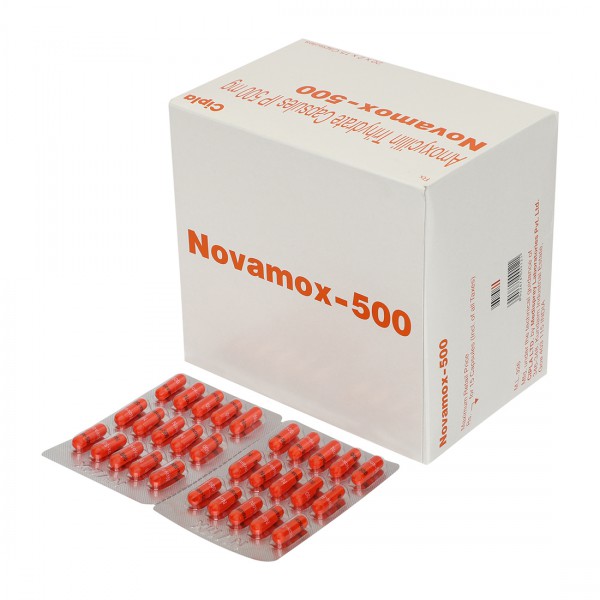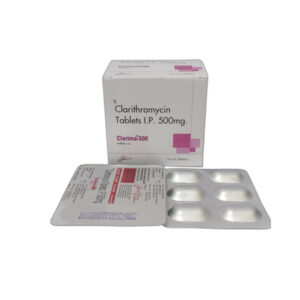Description
Novamox (Amoxicillin Trihydrate)
Amoxicillin Information
Amoxicillin is a popular medicine that is also known as Flucloxin. This drug is an antibiotic that belongs to a wide class of medicines called penicillin. This drug is known to fight harmful bacteria from the patient’s organism.
Amoxicillin Indications
Amoxicillin has proven itself to be highly effective in the treatment of bacterial infections. This medicine is usually prescribed to kill harmful bacteria. This drug is widely prescribed in the treatment of pneumonia, tonsillitis, gonorrhea, bronchitis, ear infections, Urinary Tract Infections and infections of the skin. However, this medicine might also be used in the treatment of some other medical disorders that have not been listed here.
Amoxicillin Warnings
This medicine is known to sometimes cause unwanted stomach upsets, therefore it is not recommended to take Flucloxin on an empty stomach. Try to accompany each dose of Amoxicillin with food or milk. If you experience bloody stools or severe diarrhea while using this product, you should immediately stop your treatment with it and alert your personal healthcare provider.
Every single capsule or tablet of Amoxicillin that your personal physician has prescribed you should be taken even if you start to feel better after a few days of treatment. In some cases the illnesses’ symptoms improve even if the infection has not completely cured. You must not start a treatment with Amoxicillin if you are suffering from known allergies to cephalosporin or topenicillin. This medicine should not be prescribed to patients who are suffering from kidney disorders or to patients who have intestinal or stomach disorders.
Even though Amoxicillin is known to be a stomach irritant, it should not harm pregnant women. This drug is a category B FDA pregnancy medicine. Therefore, it should not harm neither the growing fetus, nor the carrying mother, even if it is taken during pregnancy. However, this medicine’s main ingredients are known to pass into breast milk. An infant that receives small doses of this drug through milk usually becomes prone to diarrhea, yeast infection and to other allergic reactions. If you are currently nursing an infant, you should ask your personal physician if you may start taking this drug.
Amoxicillin Intake Guidelines
Follow the exact instructions that your personal doctor has given you regarding your treatment with Amoxicillin. If you have any further questions or if you are in need of additional information, contact your doctor, a pharmacist or a nurse. You should carefully read the instructions that are written on the medicine’s label.
Try to take this medicine regularly, in order to maintain the correct blood level of Amoxicillin (in this way, the infection is cured faster). You should accompany each dose of Flucloxin with a full glass of water. If you have been prescribed to take the liquid form of this medicine, you should measure the drug amount that you are about to take in with a special dose measuring device (such as a dose measuring cup or spoon). If you do not own such a device, you should buy one from your local pharmacy.
Amoxicillin Dosage
Ask your personal doctor to tell you the dose of Amoxicillin that suits you best. The correct dosage can vary from one person to another, as it is known to depend on a couple of factors (among them: age, body weight, the severity of your disorder, general health condition, etc). You should not make any alterations to the dose that you have been prescribed by your physician without asking for your doctor’s consent to do so.
Amoxicillin Overdose
If you think that you might be suffering from an overdose with this drug, you are probably in need of emergency medical care. Alert your local emergency room, your personal physician and your local poison control centre as soon as possible. The average Amoxicillin overdose symptoms are known to include twitching of toes and fingers, muscle pain, confusion, agitation, coma, numbness of toes and fingers and seizures.
Amoxicillin Missed Dose
To give the proper results, Amoxicillin should be taken in on a regular basis. If you are following a treatment with this medicine, you must try not to miss any of your prescribed doses. If you happen to miss one, take it as soon as possible (as soon as you recall) and then continue with your regular schedule. If it is already time for another dose, skip the one that you have missed. You must not take double doses of this medicine without your personal physician’s consent.
Amoxicillin Side Effects
Amoxicillin’s most common side effects are bloody stools and severe diarrhea, which may be accompanied by abdominal cramps. If you are experiencing these side effects, you should seek medical care at once. Other possible side effects sometimes include some severe allergic reactions (hives, swelling of lips, face, and throat, throat closing and breathing difficulties, unusual bruising and bleeding and sometimes even seizures). Less severe side effects include vomiting, nausea, abdominal pains, vaginal itching or discharge, soreness of the mouth or black hairy tongue.
Other side effects that have not been listed here may also occur when you take Amoxicillin. Inform your doctor immediately if you experience anything unusual while taking this medicine.
Amoxicillin Drug Reactions
While using Amoxicillin you should avoid using any other medicines (without your physician’s approval) especially:
- Other antibiotics
- Probenecid
- Methotrexate
- Allopurinol
Buy Amoxicillin
In some countries AMOXICILLIN may also be known as: AMPC,






Reviews
There are no reviews yet.